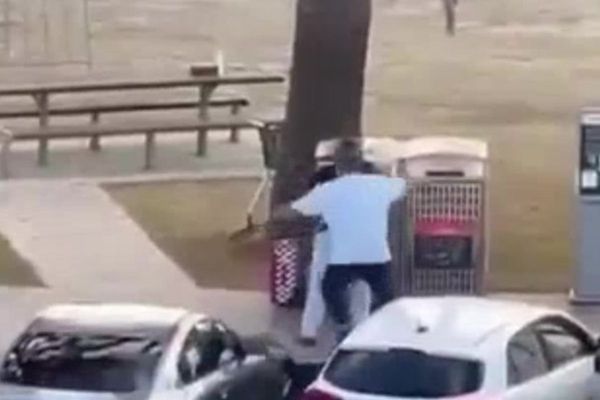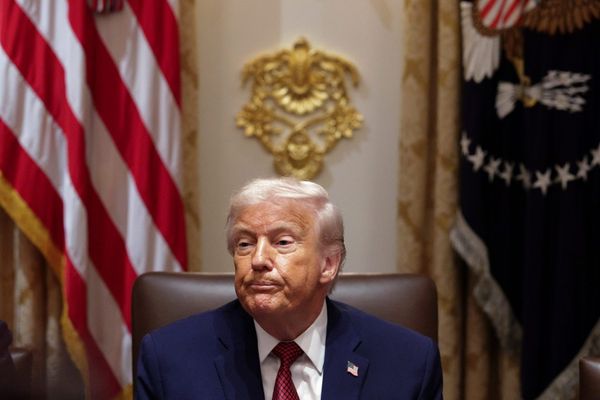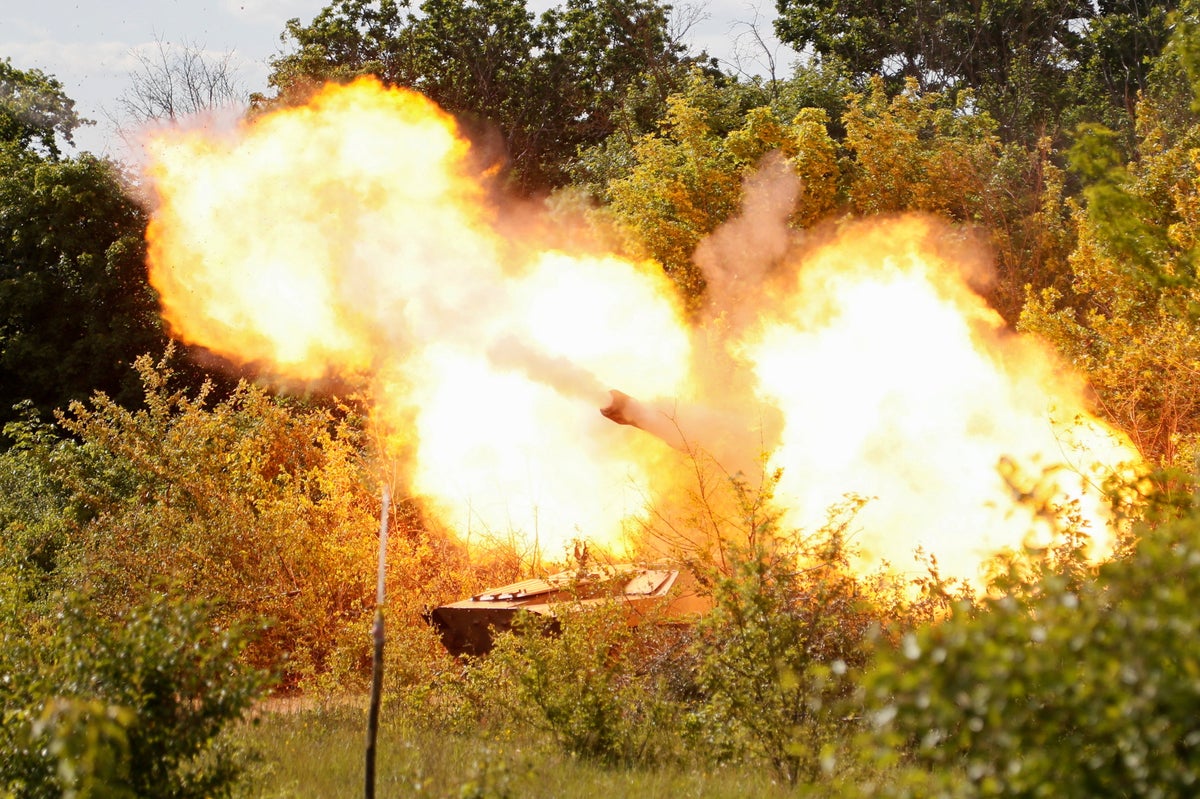
“No mother should have to watch her daughter die. No mother should have to piece together her daughter’s body. They killed her, they broke my heart, they broke the hearts of our family.”
Vera Ivanova is inconsolable in her grief.
Her daughter, Nataliya, died in a bombing in Sievierodonetsk — one of two cities, along with Lysychansk, that the Russians are trying to capture to complete their seizure of the Luhansk region in the fierce battles of eastern Ukraine.
Having failed to capture Kyiv or Kharkiv, the focus of Vladimir Putin’s forces is now on the east of the country. And they are making gains there, with Ukrainian forces outgunned and being pushed back, despite putting up fierce resistance.
Nataliya Ivanova was with her family at the sprawling Azot chemical plant which has become a place of refuge for hundreds of people in a city facing months of missile and airstrikes and artillery rounds. The death and destruction are massive in scale. More than 1,600 people have died in the fighting, and just 2,000 remain in the shattered city out of a pre-war population of 110,000.
The ferocity of the assault on Sievierodonetsk and Lysychansk has increased since Russian forces suffered heavy losses during a failed attempt to cross the Seversky Donets river earlier this month. There seems to be spite in the targeting of civilian areas now.

Around 80 per cent of the buildings in the city have been hit, with hardly any left standing in some neighbourhoods. Residents have largely retreated underground, rarely venturing out apart from occasional communal meals.
Nataliya was killed along with three others gathered outside the plant to cook and eat in the afternoon. The attack was timed, say survivors, to inflict maximum casualties.
“They took away a wife and a mother,” says a weeping Vera, who is 73. “Look at the boys, look at her husband. We are all suffering.
“We can’t even stay for her funeral, we have to leave, the church will bury her. All this suffering because of a madman and all those people who follow him.”
Natalya’s 14-year-old twin sons, Maxim and Oleksandr, sit on the ground with their arms around each other. Her husband, Vladislav Golovin, stands next to them, staring ahead.
After a moment, he shakes his head. “She was a good woman, my wife. I miss her. I don’t know why they bombed us. They say someone directed them, but why would anyone do that?” His voice fades away.
Police have arrested a man accused of being in contact with the enemy before the attack. He allegedly informed the Russians of a gathering of people out in the open: a little while later the bombing started.
“We have enough evidence to show that his man has been in communication with the Russians,” says the officer in charge of the investigation, Pavel Landik. “There are others involved; we are going to catch them.
“They bombed this place when there were a lot of people outside. It was not a military target; the idea must have been to create panic among people, create terror.”

Nicola Ivanov was also killed in the airstrike. Her husband, Mykola, suffered severe leg injuries. He was evacuated. Their son, Sergei, is trying to find where he was taken.
“My father had to be moved very quickly, and he has no documents with him,” says Sergei. “I need to find him. He was unwell before his injuries and I’m very worried about him; he might be unconscious in a hospital somewhere.”
Sergei is a giant of a man. A former professional boxer, he had been a sparring partner of Vitali Klitschko, the former world heavyweight champion now in the international limelight as the wartime mayor of Kyiv.
Sergei says Klitschko wanted to spar with him before his fight with Lennox Lewis for the undisputed world title – the “Battle of the Titans” in Los Angeles in 2003. Lewis won on a technical knockout when the bout was stopped in the sixth round due to a severe cut above Klitschko’s left eye.
“Vitali was worried about Lennox Lewis, and asked me to train with him because I had a similar style,” he recalls. “Who knows, maybe he would have won if the fight had continued. Anyway, he has become a very good mayor since then.”
He reflects: “I have been boxing since I was young. I always felt I could always look after myself, my family. But now, with what happened to my mother and father, I feel helpless.”

Sievierodonetsk and Lysychansk are experiencing continuous shelling, making them extremely difficult to reach, with routes through fields and villages necessary to avoid tank battles taking place along the main roads.
One of the two bridges across the Seversky Donets river to Sievierodonetsk has been destroyed, the other is under constant shelling. Residents and Ukrainian forces inside the city are facing near-continuous artillery fire. Water and electricity have been cut off for more than a month.
The question for Ukraine’s political and military leadership is whether the forces should be withdrawn and civilians evacuated. On Friday, the region’s governor, Serhiy Haidai, said a tactical withdrawal may be necessary. President Volodymyr Zelensky is said to be considering options.
Of the two cities, Sievierodonetsk is in more imminent danger, facing the very real risk of being surrounded and besieged as happened in Mariupol. What happened there led to anger from soldiers who had defended it until being forced to finally surrender to Russian forces.
Nicolai, an infantry sergeant, can see looming danger. “We don’t want a repeat, we don’t want the Azot plant in Sievierodonetsk to become the new Azovstal plant of Mariupol,” he says. “But, at the end of the day, it is a political decision, we’ll continue with what we do.”
Maryana Bezuhla, an MP, is in Lysychansk to observe conditions on the frontline as a member of the parliamentary committee on national security, defence and intelligence. She declines to say if Sievierodonetsk could become another Mariupol, but wants to stress the need for western nations to speed up supplies of arms needed to counter the Russian offensive.
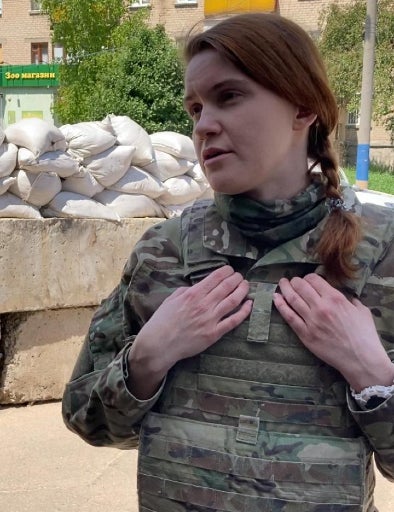
Wearing body armour (there is continuous incoming shelling as we speak) Ms Bezuhla adds: “The question of evacuation has been raised, but it is not something I can say anything about now.
“To keep defending Ukrainian territory, we need our allies to give us the weapons our soldiers need. We also badly need more ammunition; our soldiers are having to limit firing back a lot because of a lack of supplies.
“What happens in Donbas will obviously affect what happens to Ukraine, so it is essential to get these supplies. I have seen what our forces are facing, and also what people in these areas are facing. I want to thank the emergency services for all they are doing for the people here.”
Police have become the foremost emergency service on the frontlines of Sievierodonetsk and Lysychansk. They are helping to deliver food and water, evacuate civilians and injured soldiers and take the mounting numbers of dead to morgues and cemeteries.
A quarter of a mile from where Ms Bezuhla was speaking, a food distribution centre is hit by a missile and police rush out from their sandbagged station.
A huge hole has been punched out through the wall of what used to be a concert hall. A car used to deliver food is left charred by fire.
Some of those inside have been waiting for supplies while others were being evacuated.
Making his way out of the rubble, 69-year-old Oleksandr Voychevkiyiy is adamant that he and his wife will not leave. As explosions continue nearby, he acknowledges the situation is dangerous, “but this is our home, we have nowhere else to go, we shall stay and see what happens.”
Inside the damaged building, Nadiazd Samohrin also insists she will stay in Lysychansk. “I have elderly parents, both 77, they can’t travel and I am not going to abandon them,” she explains. “Anyway, this is a part of Ukraine, and I don’t want to leave a part of my own country, driven out by the Russians.”

Not everyone agrees. A group of mostly women gathers to angrily remonstrate. “It is the Ukrainians themselves doing the bombing, it’s lies saying that it’s the Russians,” shouts one of them. “It’s Nato, the Americans, the British, they are killing us,” shouts another.
Ms Samohrin tries to argue back but leaves after being jostled. “These people are angry and frightened. They believe propaganda and rumours, there’s no point in trying to hold a discussion with them,” she says. “You can see what the Russians are doing to this city they are supposed to be liberating.”
A missile, its fins spread, is embedded in the pavement near the distribution centre. Further along, another has hit a residential block, gouging out a massive bunker.
Elena Kovalova, Tatiana Salopan and Raisa Bogachov, all in their sixties, are sitting on a bench watching a family chop down a tree for fuel.
“We have nothing, no gas or electricity, no water, no money,” says Ms Kovalova. “My husband’s heart condition has got worse from the bombing. We are on the eighth floor, there are no lifts and he cannot go up and down the stairs. So he has been stuck there for months. We are living just day-to-day now, hoping we will survive.”
Ms Salopan’s hearing has been damaged by the missile strike on the buildings. “One good thing is that the bombs don’t sound so loud now,” she jokes. “But I do hope they’ll be able to repair my hearing when all this is over. In the meantime, we need some food delivered here.”
Police officer Pavel Landik, whose job now includes aid distribution as well as hunting Russian spies, says he will ensure that happens. He also asks the residents to keep an eye out for looters. “It’s war, we have to be prepared to do everything,” he tells them.
The war has claimed police lives. “What they are doing is so much beyond normal policing, at much risk to themselves,” says Colonel Oleh Hryhorov, the chief of police for the Luhansk region. “A lot of them were in Donetsk and Luhansk when the separatists took over. Our men and women had faced violence, threats and intimidation. They could have left when this war started, but they took on the additional responsibilities willingly.”
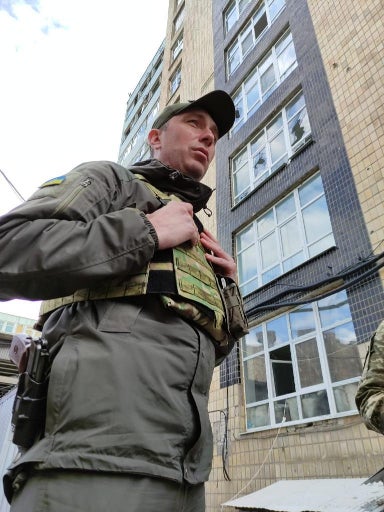
Col Hryhorov has been making journeys to Sievierodonetsk and Lysychansk from his headquarters in the town of Bakhmut, which is itself under regular fire, and appears to be held in great respect by his officers.
“I would like our country to return to a place where our citizens can have normal lives and can carry out our normal duties. But I am afraid these dark days will continue for a long while; we have a very brutal enemy trying to do us great harm,” he says.
Sergei Ivanov’s search for his father led to the sad discovery that he had died from his injuries. “I had some hope that he may have survived, and we could look after him,” Sergei says while travelling to Bakhmut to arrange the funeral. “At least we know now that we won’t be seeing him again and I can stop looking, I really wish it had not ended like this.”
Natalya Ivanov’s children, husband and mother are trying to accept that she has gone from their lives.
The two families leave Sievierodonetsk together. “We are not related,” says Vera, “but we have two things in common – our surnames and our suffering.”


